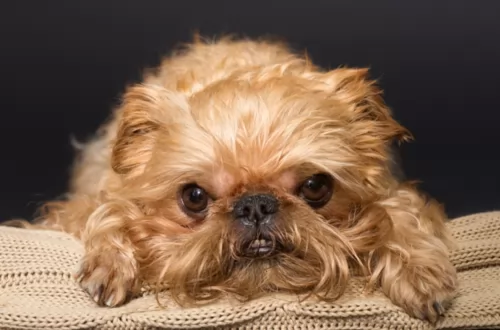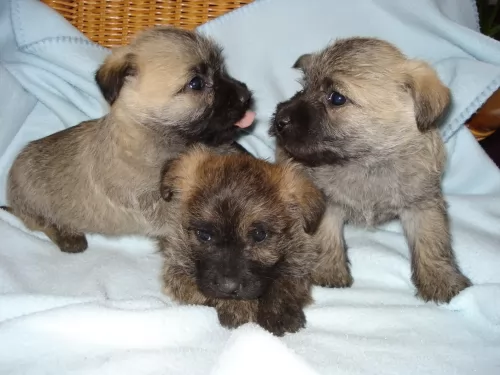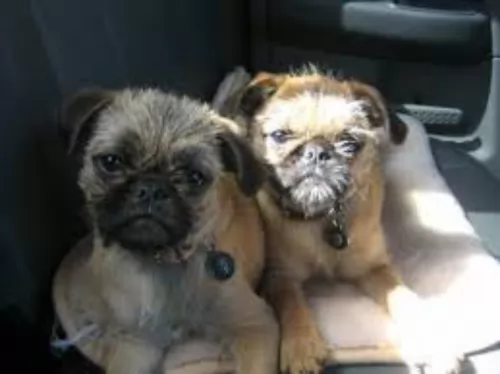 Petzlover
Petzlover Brug is originated from United States but King Charles Spaniel is originated from United Kingdom. Brug may grow 18 cm / 8 inches higher than King Charles Spaniel. Both Brug and King Charles Spaniel are having almost same weight. Both Brug and King Charles Spaniel has almost same life span. Both Brug and King Charles Spaniel has same litter size. Brug requires High Maintenance. But King Charles Spaniel requires Moderate Maintenance
Brug is originated from United States but King Charles Spaniel is originated from United Kingdom. Brug may grow 18 cm / 8 inches higher than King Charles Spaniel. Both Brug and King Charles Spaniel are having almost same weight. Both Brug and King Charles Spaniel has almost same life span. Both Brug and King Charles Spaniel has same litter size. Brug requires High Maintenance. But King Charles Spaniel requires Moderate Maintenance
 The Brug or Griffon Pug is not a purebred dog at this point in time. It is a cross between a Pug and a Brussels Griffon, currently known as a “designer dog” or a hybrid. This hybrid is really rare at this time but growing in popularity and breeders. Its exact history or original development is unknown at this time and needs to be researched as the hybrid develops into a breed, or breed clubs are formed. If you like either of the two breeds involved, you are sure to like the Brug. They are obviously not recognized by the major kennel clubs, but they are registered with a variety of hybrid/designer dog clubs. These include:
The Brug or Griffon Pug is not a purebred dog at this point in time. It is a cross between a Pug and a Brussels Griffon, currently known as a “designer dog” or a hybrid. This hybrid is really rare at this time but growing in popularity and breeders. Its exact history or original development is unknown at this time and needs to be researched as the hybrid develops into a breed, or breed clubs are formed. If you like either of the two breeds involved, you are sure to like the Brug. They are obviously not recognized by the major kennel clubs, but they are registered with a variety of hybrid/designer dog clubs. These include:
 Classified as a toy breed, the King Charles Spaniel is a small, pure breed dog that originated in the United Kingdom. The dog was named after King Charles II of Britain.
Classified as a toy breed, the King Charles Spaniel is a small, pure breed dog that originated in the United Kingdom. The dog was named after King Charles II of Britain.
The dog actually has quite a long, illustrious history. People mistake them for the Cavalier King Charles Spaniel, but they are 2 different breeds, just sharing the same coat colors.The King Charles Spaniel was crossbred with the Pug early in the 19th century to shorten the length of the dog's nose.
With a face similar to that of the Pug, it is thought that these toy spaniels may have originated in the Far East.The earliest recorded pictures of toy spaniels in England were in paintings of Queen Mary 1 and King Philip.
 Like its two parental breeds, the Brug is a smaller sized dog – both parents are lab dogs and so is the Brug. Because they are hybrids, Brugs can be very different in appearance but most seem to have large eyes, squishy faces, black masks, fluffy hair, long black whiskers, short fluffy hair, flat ears and a fluffy tail. They could be in any of a number of colors including fawn, black, cream or apricot.
Like its two parental breeds, the Brug is a smaller sized dog – both parents are lab dogs and so is the Brug. Because they are hybrids, Brugs can be very different in appearance but most seem to have large eyes, squishy faces, black masks, fluffy hair, long black whiskers, short fluffy hair, flat ears and a fluffy tail. They could be in any of a number of colors including fawn, black, cream or apricot.
 The King Charles Spaniel is a medium sized dog that stands at roughly 23 – 28cm and weighs anything from 3 to 8kg. He is smaller than the Cavalier King Charles.
The King Charles Spaniel is a medium sized dog that stands at roughly 23 – 28cm and weighs anything from 3 to 8kg. He is smaller than the Cavalier King Charles.
He has a long coat which can be white, black and tan or a reddish-brown color. He has a domed head with a short, turned up nose and 'squashed' face similar to the pug. The eyes are large and dark and also protruding. The ears are set low and are long and floppy and the tail, once docked, is now left long and feathery.
Friendly, while being somewhat reserved, the King Charles Spaniel is looked upon as a lap dog as he loves to spend time indoors with his human family.
He isn't particularly energetic, but will still need some exercise like ball games and going on a walk. With training and socialization he becomes quiet and obedient and is known as a popular therapy dog. They are kind and loving with kids and pets in the home.
 This hybrid is a loyal little dog. They are an affectionate lap dog that wants to be with his humans all the time. They have a very pleasant disposition and do well with children and other dogs. They might be shy to begin with but will warm up to affection. However, they are willful and self-important at times. This is tempered by their great sense of humor and empathy to its peoples’ moods. Left alone too long, they will tend to bark excessively.
This hybrid is a loyal little dog. They are an affectionate lap dog that wants to be with his humans all the time. They have a very pleasant disposition and do well with children and other dogs. They might be shy to begin with but will warm up to affection. However, they are willful and self-important at times. This is tempered by their great sense of humor and empathy to its peoples’ moods. Left alone too long, they will tend to bark excessively.
 Your King Charles Spaniel is such a joy to have in the home and because he is intelligent he will easily learn some simple commands too.
Your King Charles Spaniel is such a joy to have in the home and because he is intelligent he will easily learn some simple commands too.
He wants to please you and be with you wherever you go. He is a social dog and thrives on your attention, and if you open your home and your heart to this sweet dog, you’re going to have a devoted, loving, loyal friend beside you every day.
 Usually the hybrid dog can have better health than either of the parents. This is true with the Brug as well, but there are also some issues they may inherit from the parents or face simply because of their size and complexion. These include:
Usually the hybrid dog can have better health than either of the parents. This is true with the Brug as well, but there are also some issues they may inherit from the parents or face simply because of their size and complexion. These include:
 The eye problems that you might need to know about with a King Charles Spaniel are entropian, cataracts and corneal dystrophy.
The eye problems that you might need to know about with a King Charles Spaniel are entropian, cataracts and corneal dystrophy.
Heart conditions could include mitral valve disease where the blood flows backwards through the chambers of the heart, leading to congestive heart failure.
The King Charles Spaniel is a brachycephalic breed and these dogs can have upper airway problems. Breathing difficulties can also occur because of an abnormally small windpipe which is a characteristic common to brachycephalic breeds. You may notice rapid breathing with your dog , snoring, frequent panting, coughing and difficulty with swallowing.
As a dog owner, you have a responsibility to your pet. He will need to visit the veterinarian for all his puppy vaccinations as well as other vaccinations as an adult dog. He will also need to be de-wormed.
If you don’t want him or her becoming a parent, make sure your pet is neutered or spayed. If your pet is showing signs of an illness that he doesn’t get over quickly, get him immediately to the vet.
 Don’t let this dog get overweight. Feed a high quality dry food intended for small or toy dogs. One fourth to one half of a cup per day in two separate meals is what is recommended.
Don’t let this dog get overweight. Feed a high quality dry food intended for small or toy dogs. One fourth to one half of a cup per day in two separate meals is what is recommended.
Patella Luxation or slipped knee caps – small dogs often have this issue. The patella is the knee cap and layman often called it a slipped knee cap, but it is also called slipped stifles. The femur, the tibia and the patella do not line up and this causes an abnormal gait or even lameness. Puppies are born with this, but it does not exhibit symptoms until years later. Arthritis is the most common result. Occasionally surgery is required.
Eye Issues – Cherry eye, a genetic disease, as well as irritation from air borne particles, allergies or scratches.
Skin Allergies – They can have skin allergies so watch for excessive licking or scratching.
Breathing Issues – Asthma and respiratory issues are common among small dogs with these types of faces.
Like their 2 breed parents, the Brug is a small but energetic hybrid. They need to play and run on a daily basis. Leash walks are good, but they need a yard or dog park as well. They are athletic little dogs and are good at tracking, obedience and agility. You cannot force them to do an activity but if its fun they will jump right in.
 Your King Charles Spaniel has a long, silky coat that will require brushing twice a week to control shedding and keep his coat free of matting.
Your King Charles Spaniel has a long, silky coat that will require brushing twice a week to control shedding and keep his coat free of matting.
His nails will also require regular trimming to ensure they don’t hook on anything. His long ears are also prone to ear infection, so be sure to check them inside and out for ticks and fleas and to also remove excess wax and dirt.
Teeth should also be regularly brushed with canine toothbrush and toothpaste.
Be sure to keep your King Charles Spaniel content and healthy by ensuring he goes on a long walk and that you play with him to build a strong bond between you and to ensure he doesn’t become bored.
Excellent, quality food is important for your spaniel. The best dog food manufacturers have age- and breed-specific formulas and there is the perfect one for your King Charles Spaniel. Homemade food is also excellent for this dog and you can add some cooked chicken, brown rice and vegetables into his kibble as a nutritious treat.
Make sure your spaniel has a warm, dry, peaceful place to sleep and wash the bedding regularly to keep him healthy and happy.
Ensure he always has a cool, fresh bowl of drinking water nearby.